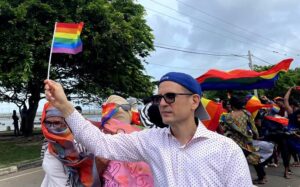
The Right to Life Human Rights Centre welcomes the growing national conversation surrounding the LGBTIQ+ community in Sri Lanka. As an organisation committed to upholding the fundamental rights and freedoms of all individuals, we recognise that the current legal framework poses a significant human rights challenge that must be addressed urgently.
Our position is that the repeal or amendment of the discriminatory provisions within the Penal Code is a foundational step for gender equality and equity in Sri Lanka.
The Policy of Non-Discrimination and Dignity
The continued existence of Sections 365 and 365A of the Sri Lanka Penal Code is a direct contradiction of the principles of human dignity and equality guaranteed to all citizens. These colonial-era laws, dating back to 1883, criminalise consensual same-sex relations and directly infringe upon the sexual orientation and gender identity (SOGI) rights of LGBTIQ+ individuals.
The Discriminatory Clauses
- Section 365: Unnatural Offences This section criminalises “carnal intercourse against the order of nature with any man, woman, or animal,” carrying a punishment of up to ten years’ imprisonment and a fine. The inclusion of “man” and “woman” has historically been used to criminalise consensual same-sex activity.
- Section 365A: Acts of Gross Indecency Between Persons This section penalises any person who “commits, or is a party to the commission of, or procures or attempts to procure the commission by any person of, any act of gross indecency with another person,” carrying a penalty of up to two years’ imprisonment or a fine.
These provisions are used to target individuals based on their real or perceived sexual orientation and gender identity, placing the entire LGBTIQ+ community—including lesbian, gay, bisexual, transgender, intersex, and queer persons—at risk of harassment, discrimination, and prosecution. This legal Sword of Damocles undermines their security, privacy, and ability to fully participate in society.
Welcoming the Path to Legislative Reform
The Right to Life Human Rights Centre strongly supports the recent progress made toward decriminalisation. We note that the Supreme Court of Sri Lanka, dismissing petitions challenging the move, has determined that the Private Member’s Bill introduced by Member of Parliament of the previous parliament, Premnath C. Dolawatte, to amend the Penal Code is not unconstitutional. This crucial ruling confirms that the decriminalisation of consensual adult same-sex relations can be passed by Parliament with a simple majority.
Proposed Legislative Amendments
The proposed Bill seeks to rectify this historical injustice by:
- Amending Section 365: By removing the phrases “any man, woman” from the provision, the scope of the offence is narrowed to only criminalise carnal intercourse “against the order of nature with an animal,” thereby decriminalising consensual same-sex activity between adults.
- Repealing Section 365A: The entire section relating to “Acts of Gross Indecency Between Persons” is proposed to be removed.
Our Gender and Human Rights Policy Stance
The Right to Life Human Rights Centre asserts that the right to equality and non-discrimination is universal. Our policy demands that the State protect the rights of all persons, irrespective of their SOGI.
The retention of Sections 365 and 365A is inconsistent with:
- International Human Rights Standards: Including those upheld by UN treaty bodies, which call for the repeal of laws criminalising consensual same-sex activity.
- Fundamental Rights: Violating the rights to privacy, equality, and protection from arbitrary arrest and detention.
- Human Dignity: Degrading and stigmatising an entire segment of the population.
Decriminalisation is not just a legislative technicality; it is a human rights imperative. It is the necessary prerequisite for creating a society where every individual can live with dignity, respect, and freedom. We call upon all Parliamentarians to respect the Supreme Court’s determination and to prioritise the swift passage of the actions for the retention of Sections 365 and 365A of the Penal Code, thereby aligning Sri Lanka’s laws with contemporary human rights standards.
A country cannot authentically promote itself as an inclusive destination while retaining discriminatory laws against its own citizens. Human rights must come first.
